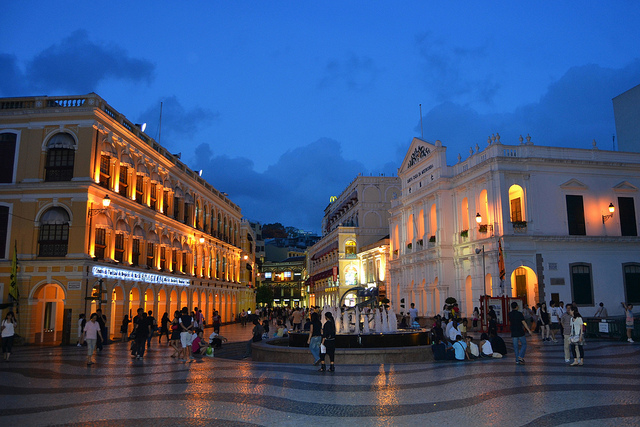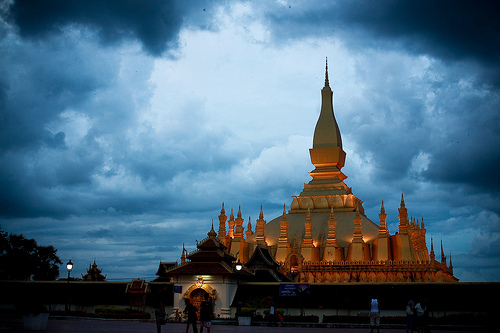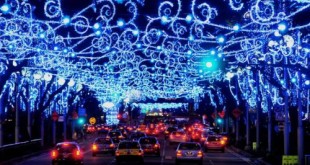Cambodia is a study in contrast. Bathed in the grim aftermath of the Khmer Regime, it shines bright with its cultural and architectural pride, Angkor Wat.
Cambodia may be keeping up with the influence of the West, but it clings fast to its historical roots and heritage. It was once the center of the mighty and expansive Angkorian empire, and this bit of history peeks out and tantalizes despite the “sweeping changes” (to put it mildly) made by Pol Pot and his cohorts.
Public holidays in Cambodia see closure of government offices, banks and most major establishments, but it is during the traditional Khmer New Year that the country grounds to a halt. Below is the Cambodia public holiday schedule 2014, with Buddhist holidays (which are based on the sighting of the moon) yet to be confirmed by ‘prakas’ or decrees issued by the Cambodian Royal Government.
New Year’s Day – Wednesday, 01 January 2014
Cambodia also celebrates the first day of the first month of the Gregorian calendar but to a lesser degree than their own traditional New Year.
Makara – Tuesday, 07 January 2014
The atrocities of the Khmer Regime are one of the bloodiest in the history of the world. But modern Cambodians would rather move on than commemorate the destruction in life and liberty left by the Communist Party, and this moving forward is best reflected in the country’s celebration of Victory Day, or the day when Pol Pot’s regime ended. This day is celebrated with speeches from key government officials and cultural performances while street rallies take place in the capital, Phnom Penh. The families remember the victims of Pol Pot era in solemn ceremonies.
Meak Bochea Festival – Friday, 14 February 2014
Held on the full moon of the third lunar month, Meak Bochea is the commemoration of the spontaneous gathering of 1,250 monks to pay homage to Buddha. Seeing this as an opportunity to preach, Buddha laid down the three precepts of the religion to the monks in attendance: perform good deeds, refrain from doing harm, and cleanse the mind. This Buddhist occasion is celebrated by both monks and the lay who participate in candlelit processions around the nearest temples in their vicinity.
International Women’s Day – Saturday, 08 March 2014
Interestingly, despite its “colored” history, Cambodia celebrates the social, economic and political contributions of women in their society.
Chaul Chnam Thmey – Monday to Wednesday, 14 to 16 April 2014
The Khmer New Year is officially celebrated for three days. Families clean their homes on the first day and prepare traditional foods that are blessed by local monks. On the succeeding days, Cambodian Buddhists make merits in the temples and play traditional games. On the final day of Chaul Chnam Thmey, Cambodians bless each other with a sprinkling (or splashing) of water in the same tradition as Thailand’s Songkran and India’s Holi (although Indians use paint).
International Labor Day – Thursday, 01 May 2014
Cambodia honors its labor force and its political and social contributions to the country’s economy.
King Norodom Sihamoni’s Birthday – Tuesday to Thursday, 13 to 15 May 2014
Another occasion that pull all stops in Cambodia is King Norodom Sihamoni’s Birthday. The king makes merits to the monks (food offerings) and the country’s underprivileged, while for three days, Cambodia’s streets are filled with colorful signage that congratulate the king on his natal day.
Visaka Bochea – (to be determined, but usually in April or May)
Unlike Christians who celebrate the birth, death and resurrection of their savior on separate occasions, Buddhists celebrate the birth, enlightenment and death of Buddha on this day. Monks take this time to meditate on the teachings of Buddha and chant sacred hymns in their temples, while the lay offer food and robes to the local temple for the monks to use.
Royal Ploughing Ceremony Day – (to be determined, but usually on the third week of May)
Being a highly agricultural country, Cambodia celebrates the start of their rice planting season seriously. In a throwback to mid-13th century, Cambodians celebrate “Pithi Chrat Preah Neanng Korl” by ploughing the fields with sacred cows and divining the coming planting season based on what the cows ate afterwards. This ancient ritual is continued to this day by the representatives of the king who perform the ceremony in Phnom Penh.
International Children’s Day and Cambodia Children’s Day – Sunday, 01 June 2014
Cambodia upholds the United Nations’ Rights of the Child and celebrates these inalienable rights on this day.
Her Majesty the King’s Mother Queen Norodom Monineath Sihanouk Birthday – Wednesday,18 June 2014
Like Thais, Cambodians revere their royalty as manifested in the various occasions that celebrate key personalities in the current ruling family. This day celebrates the birthday of the Queen Mother Norodom Monineath Sihanouk, the mother of Cambodia’s current monarch.
Constitutional Day – Wednesday, 24 September 2014
After years under Pol Pot dictatorship and the ensuing dependence on the Vietnamese, Cambodia was ready to see some changes. On this day in 1993, Cambodia became a constitutional monarchy when the king became the head of state and the legislative body held de facto political power. Government offices, banks and financial institutions and a majority of businesses are closed on this day to observe the political transition of the country.
Pchum Ben Festival (Ancestor Day) – Friday to Sunday, 26 to 28 September 2014
The Khmer Festival of the Dead is celebrated for 15 days and culminates on Ancestor Day or Dak Ben. Much like the Filipino practice of “Visita Iglesia” or church visit, Cambodians try to visit at least seven pagodas during the festival to offer food to their departed and light candles to guide the path of the deceased to the offering. They also scatter rice-sesame seed mixtures on the ground to feed the hungry spirits of ancestors who roam Pchum Ben.
Anniversary of the Crowning Ceremony of His Majesty the King Boromneath Norodom Sihamoni – Wednesday, 15 October 2014
Norodom Sihanouk abdicated his throne in 2004. In his stead, a special Cambodian council appointed Prince Norodom Sihamoni to take his place. This day commemorates that event.
Paris Peace Agreement Day – Thursday, 23 October 2014
Reinstated as a public holiday in October 2012, the Paris Peace Agreement Day commemorates the day when the United Nations was given full authority – by four Cambodian parties, 18 countries and UN representatives who met in Paris two years earlier – to oversee ceasefire, send the displaced Khmer from Thai border back to the country, disarm warring parties, and pave the road for a national election.
King Norodom Sihamoni’s Coronation Day – Wednesday, 29 October 2014
Prince Norodom Sihamoni was officially crowned on this day in 2004 after his father King Norodom Sihanouk abdicated the throne.
Independence Day – Sunday, 09 November 2014
Before Cambodia fell in the hands of Pol Pot, it was a French colony until 1953. Independence Day celebrations are held in the Independence Monument at Phnom Penh, where the current monarch lights a victory fire while the country’s key officials and personalities are in attendance. All throughout the day, there are cultural performances, parades along the Norodom Boulevard, and fireworks at night.
Water Festival Ceremony Day (to be determined, but usually around November)
On the full moon of Kadeuk, millions of Cambodians celebrate the reversing of the flow of Tonle Sap. As the lake drains into the Mekong River, fluvial parades and boat races are held in the lake’s banks. The riversides are a picture of boisterous merriment as the sound of the bands, the clink of beer bottles and roaring cheers for boat racers fill the atmosphere. Cambodians splash each other with water on this day as a sign of cleansing and good wishes for the year ahead.
International Human Rights Day – Wednesday, 10 December 2014
Despite Cambodia’s dubious record in human rights, it observes the United Nations General Assembly Universal Declaration of Human Rights issued on this day in 1948.


